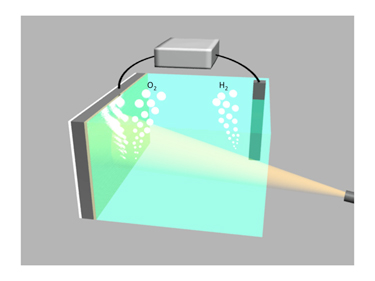Robust water-splitting technology
Solar water splitting, in which water is separated into oxygen and hydrogen using sunlight, could be a clean and renewable way to produce energy, and researchers are busy looking for efficient photoelectrode materials for use in this process. Silicon, which is widely used in solar cells, would be ideal in this respect if it were not for the fact that it corrodes in the electrolyte solutions used in PECs.
Two years ago, a team from Stanford tried to overcome this problem by protecting the silicon electrodes with an ultrathin coating of titanium dioxide and iridium. The resulting water splitter showed promise because it managed to produce hydrogen and oxygen for eight hours without corroding. However, for real-world PEC electrodes even longer-term stability is needed, says team leader Hongjie Dai, and materials that are cheaper than the precious metal iridium.
Alternative coating
Dai’s group has now come up with a much lower-cost alternative coating for silicon electrodes: ordinary nickel. This metal is not only corrosion-resistant, cheap and stable (it can go for more than 24 hours without corroding), but a 2 nm-thick nickel film on an n-type silicon electrode also acts as an active catalyst for producing oxygen in the water-splitting reaction. The nickel appears to combine with the native silicon oxide layer that naturally forms on silicon electrodes when they are exposed to air, and the surface of the nickel oxidizes in the electrolyte to form nickel oxide. The resulting NiOx/Ni/SiO/Si structure can generate a voltage of 500 mV when exposed to light – which is on a par with previous such devices.
To further improve performance, the researchers mixed lithium into the water-based electrolyte used in their PEC and found that the electrodes became even more stable – working for more than 80 hours without corroding. Such a result is interesting in itself because lithium has been used to make better nickel batteries since the days of Thomas Edison, and we now find that it helps make better water-splitting devices too, says Dai.
The Stanford team is now busy working on further improving the stability of its nickel-coated silicon electrodes. It will also be trying out electrodes made from other materials aside silicon.

